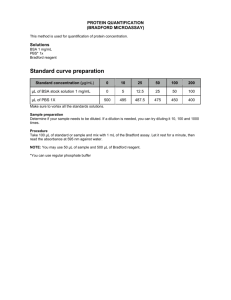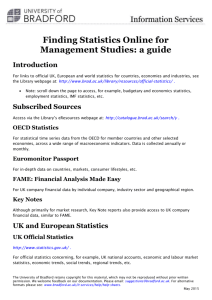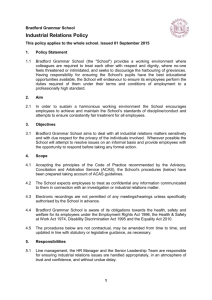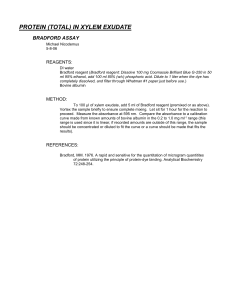1 - University of Bradford
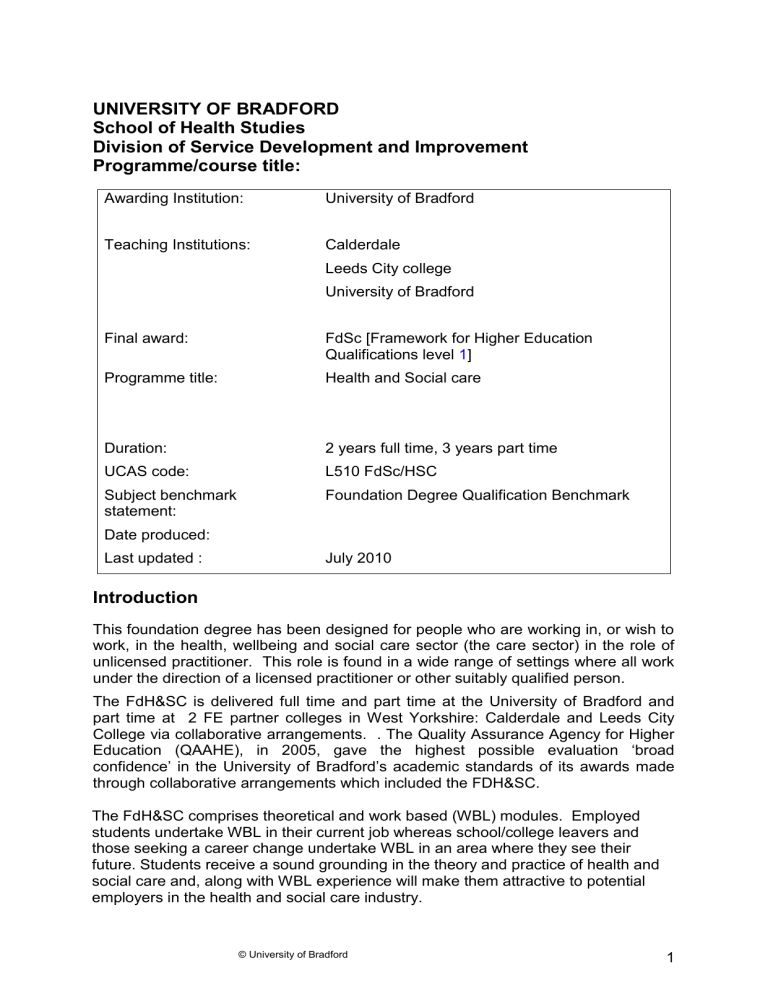
UNIVERSITY OF BRADFORD
School of Health Studies
Division of Service Development and Improvement
Programme/course title:
Awarding Institution:
Teaching Institutions:
Final award:
Programme title:
Duration:
UCAS code:
Subject benchmark statement:
Date produced:
Last updated :
University of Bradford
Calderdale
Leeds City college
University of Bradford
FdSc [Framework for Higher Education
Qualifications level 1 ]
Health and Social care
2 years full time, 3 years part time
L510 FdSc/HSC
Foundation Degree Qualification Benchmark
July 2010
Introduction
This foundation degree has been designed for people who are working in, or wish to work, in the health, wellbeing and social care sector (the care sector) in the role of unlicensed practitioner. This role is found in a wide range of settings where all work under the direction of a licensed practitioner or other suitably qualified person.
The FdH&SC is delivered full time and part time at the University of Bradford and part time at 2 FE partner colleges in West Yorkshire: Calderdale and Leeds City
College via collaborative arrangements. . The Quality Assurance Agency for Higher
Education (QAAHE), in 2005, gave the highest possible evaluation ‘broad confidence’ in the University of Bradford’s academic standards of its awards made through collaborative arrangements which included the FDH&SC.
The FdH&SC comprises theoretical and work based (WBL) modules. Employed students undertake WBL in their current job whereas school/college leavers and those seeking a career change undertake WBL in an area where they see their future. Students receive a sound grounding in the theory and practice of health and social care and, along with WBL experience will make them attractive to potential employers in the health and social care industry.
© University of Bradford
1
You will learn about key approaches in, and explanations of, health and social care in addition to developing personal transferable skills in team working, problem solving, communication and IT. You will also develop a sound and critical understanding of policy, theory and practice.
You will examine the context and processes of change in yourself, in groups and in services, including ways of collaborative working across agencies and professional boundaries. By the end of your studies you will be able to evaluate the different roles in the context of policy development, and recognise and value diversity and difference. You will also understand how ethical, legal, social, economic and political factors influence the provision and development of services, in addition to developing the critical and analytical skills needed to engage in the understanding and development of evidence-based practice.
Excellent academic facilities are located at the School of Health Studies, University of Bradford, and at each of the colleges: Calderdale and Leeds City College At all sites learner support spanning information technology, library facilities, study skills and student financial and information services are available.
Programme Aims
The programme will allow you to:
A1 Gain and apply appropriate knowledge, skills and attitudes to work as a reflective unlicensed practitioner in your chosen area of health and social care
A2 Develop interpersonal and team working communication skills
A3 Develop problem-solving and critical thinking skills and apply to health and social care
A4 Commence lifelong learning including undertaking future personal and professional development and career growth
A5 Recognise the limits and boundaries of your knowledge, understanding and practical skills.
Programme Learning Outcomes
Once you have successfully completed the programme, you will be able to:
LO1 Discuss physical, pathological concepts and psychosocial theories relevant to health and social care
LO2 Evaluate broad legal, ethical and cultural factors underpinning service users care in the NHS, Social Services and the voluntary sectors
LO3 Analyse and evaluate current developments both in the practice and the contextual nature of health and social care service provision including the structure, policies and practices of the National Health Service (NHS), Social
Services and voluntary services
LO4 Evaluate the role of an unlicensed practitioner in practice
LO5 Acquire and evaluate information from a variety of sources
© University of Bradford
2
LO6 Apply problem-solving and critical thinking skills in academic, pre practice and practice settings
LO7 Improve service delivery by evaluating and applying best evidence based practice to meet individual service users and employers needs
LO8 Deliver safe and ethical reflective practice under the direction of a licensed to practice practitioner or other suitably qualified person within defined guidelines
LO9 Apply communication skills in order to deal with a variety of both straightforward and complex subjects
LO10 Apply the skills of working with others to both straightforward and complex work, in one-to-one and group situations,
LO11 Apply problem-solving skills (Critical thinking, planning and organising, reviewing and evaluating) in a variety of settings
LO12 Apply information technology skills to suit different purposes including: finding, exploring, developing and presenting information using text, images and numbers,
LO13 Plan and review own learning and improve performance,
Curriculum
Stage 1
Module
Code
Module Title
HH-1005J Personal and Professional
Development Planning
HH-1006D Health, Safety and Security
HH-1007D Health and Social Care Policy
HH-1008T Work Based Learning 1:
Introduction to Practice
HH-1009D Equality and Diversity
Stage 2
Module
Code
Module Title
HH-2021D Health and Social Sciences
HH-2022D Legal and Ethical Aspects of Health and Social Care
HH-2023D Work Based Learning 2: Practice and the Service User
HH-2024D Service Improvement: Evidence
Based Practice
HH-2025Q
Work Based Learning 3: Practice in
Context
Type core core core core core
Type core core core core core
Credits Level
30
20
20
30
1
1
1
1
Study period semester 1 and 2
1
1
2
20 1
Credits Level
20
20
20
20
40
2
2
2
2
2
2
Study period
1
1
1
2
2
© University of Bradford
3
At stage 1 you will begin by studying the Personal and Professional Development
Planning module which will allow you to analyse your own strengths and development needs and to prepare a personal development plan to meet your identified needs. You will be introduced to the role of the unlicensed practitioner and prepared to work safely in a care setting and understand issues related to equality and diversity. You will also have knowledge of the mail policies related to health and social care.
At stage 2 you will undertake two work based learning modules in an area of your choice. You will also study four modules which introduce you to key topics in relation to work within the health and social care sectors. All modules are core.
The curriculum may change, subject to the University's course approval, monitoring and review procedures.
Teaching and Assessment
Strategies
A significant proportion of of the teaching and learning takes place in the work place or placement. A mentor will supervise you throughout your WBL and will help: develop your WBL skills and confidence, teach role specific matter and skills based upon your job description, assist with planning and supervising your WBL experiences whilst offering honest and constructive feedback essential for personal and professional development.
It is recognised that you may not have studied at a HE level before. There is, therefore, a high level of initial staff support during semester 1 of year 1. This is, however, progressively reduced as your confidence grows. Teaching staff comprise experienced health and social professions who provide subject specialist knowledge.
Teaching methods consist of lectures, group and individual tutorials, workshops, use of the VLE, guided reading (LO 1-6, 9-12) . WBL will allow you to achieve learning outcomes LO1, 4-11,13. The Personal and Professional Development Planning module will allow you to analyse your development needs and produce a plan to meet these needs (LO13).
A variety of assessment strategies are used including written assignments, electronic assessment, presentation, reflective journal, and assessment of a learning contract.
Assessment Regulations
This Programme conforms to the standard University Assessment Regulations which are available at the following link: http://www.brad.ac.uk/admin/acsec/QA_Hbk/Undergrad_Regs_.html
Admission Requirements
Standard Paragraphs below
The University welcomes applications from all potential students regardless of their previous academic experience; offers are made following detailed consideration of each individual application. Most important in the decision to offer a place is our assessment of a candidate’s potential to benefit from their studies and of their ability
© University of Bradford
4
to succeed on this particular programme. Entrance requirements for each programme will vary but consideration of your application will be based on a combination of your formal academic qualifications and other relevant experience.
If you have prior certificated learning or professional experience which may be equivalent to parts of this programme, the University has procedures to evaluate this learning in order to provide you with exemptions from specified modules contained within the curriculum. Please talk to us if you do not fit the standard pattern of entry qualifications.
The University of Bradford has always welcomed applications from disabled students, and these will be considered on the same academic grounds as are applied to all applicants. If you have some form of disability you may wish to contact the programme leader before you apply.
A typical offer to someone seeking entry through the UCAS scheme would be 120
UCAS points from a combination of A levels, BTEC, OCR and AS awards to include at least 1 full A level or I vocational award of equal depth plus GCSE English language at grade C or above, or Key Skills equivalent. However, applications are welcome from mature students (those over 21 years of age on entry) and candidates with non-standard qualifications or who, lacking academic qualifications, have significant relevant experience. On completion of a UCAS form you will be invited to the School for an Open Day when you will have the opportunity to meet staff, view the facilities and discuss “the Bradford experience” with current students.
Learning Resources
The JB Priestley Library on the city campus and our specialist libraries in the School of Health and the School of Management provide a wide range of printed and electronic resources to support your studies. We offer quiet study space if you want to work on your own, and group study areas for the times when you need to discuss work with fellow students. Subject librarians for each School provide training sessions and individual guidance in finding the information you need for your assignment, and will help you organise your references properly.
Student PC clusters can be found in all our libraries and elsewhere on the campus.
Many of these are open 24/7. You can also use the University's wireless network to access the internet from your own laptop. Most of our online journals are available on the internet (both on and off campus), and you can also access your University email account, personal information and course-related materials this way.
Staff are on hand during the daytime to help you if you get stuck, and there is a 24/7
IT helpline available.
Student Support and Guidance
Course Team
Support for you personally and in your course of study, will be provided both by the
University/College and the Course Team. You will be allocated a personal tutor who is someone with whom you will be able to talk about any academic or personal concerns. The School will ensure that there is someone available with whom you feel comfortable to help and support you. You will be provided with a comprehensive series of handbooks that you can consult on a range of learning issues and your course tutors will be available to consult on subject specific queries.
© University of Bradford
5
The Hub, Student Support Centre
The Hub, Student Support Centre provides a central reception where students can receive information, advice and guidance on a whole range of topics about their life at University. The Hub is located in the Richmond Building adjacent to the Atrium.
The teams located within The Hub:
Accommodation
Admissions o o
Education Liaison
Enquiries
Student Administration and Support o o
Bursaries and Financial Support
Finance and Credit Control Group o o
Payzone
Records and Tuition Fees
International Office
Customer Service Team www.brad.ac.uk/hub
+44 1274 232233
Students’ Union
We value the feedback p rovided by students and collaborate with the Students’
Union, through a system of course representatives and formal staff student liaison committees, so that any issues you wish to raise are addressed rapidly.
The Students’ Union and the University of Bradford work in partnership to provide confidential counselling and welfare services where you can get help with any aspect of your personal or academic life. Student Financial and Information Services
(based in the Hub) will provide you with information about a diverse range of issues such as council tax, personal safety and tourist information. International Students can access a range of additional advice and support services through the Student’s
Union.
Careers and Employability
The University is committed to helping students develop and enhance employability and this is an integral part of many programmes. Specialist support is available throughout the course from Career Development Services including help to find part time work while studying, placements, vacation work and graduate vacancies.
Students are encouraged to access this support at an early stage and to use the extensive resources on the web site www.careers.brad.ac.uk
.
Discussing options with specialist advisers helps to clarify plans through exploring options and refining skills of job-hunting. In most of programmes there is direct input by Career Development Advisers into the curriculum or through specially arranged workshops. These may take place as early as year 1, or may be achieved through a customised Career and Personal Development module in year 2 or 3 which is developed in close cooperation with the academic department. An annual First
Destination Survey leads to compilation of a report on the outcomes of all
© University of Bradford
6
programmes and to the development of an annually updated Traffic Light Analysis of
Employability which is used as a performance indicator.
Learner Development Unit (LDU)
The Learner Development Unit provides support in all aspects of academic, maths, numeracy and interpersonal skills. A programme of interactive workshops is delivered during both semesters which complements individual support available from Advisers and the wide range of interactive online materials available from the
LDU website.
Disability
Disabled students will find a supportive environment at Bradford where we are committed to ensuring that all aspects of student life are accessible to everyone.
The Disability Service can help by providing equipment and advice to help you get the most out of your time at Bradford and is a place where you can discuss any concerns you may have about adjustments that you may need, whether these relate to study, personal care or other issues. For more information contact the Disability
Service by phoning: 01274 233739 or via email: disabilities@bradford.ac.uk
University policies and initiatives
Ecoversity:
Ecoversity is a strategic project of the University which aims to embed the principles of sustainable development into our decision-making, learning and teaching, research activities campus operations and lives of our staff and students. We do not claim to be a beacon for sustainable development but we aspire to become a leading
University in this area. The facilities we create for teaching and learning, including teaching spaces, laboratories, IT labs and social spaces, will increasingly reflect our commitments to sustainable development. Staff and student participation in this initiative is crucial to its success and its inclusion in the programme specification is a clear signal that it is at the forefront of our thinking in programme development, delivery, monitoring and review. For more details see www.bradford.ac.uk/ecoversity
Further Information:
For further information, please check the University prospectus or contact
Admissions.
The Admissions Office
The University of Bradford
The Admissions Office
School of Health Studies
Richmond Road
Bradford, BD7 1DP
UK
+44 (0)1274 233054 http://www.brad.ac.uk/courses /
The University of Bradford
25 Trinity Road
Bradford, BD7 1DP
UK
+44 (0)1274 soh-recruitment@bradford.ac.uk
© University of Bradford
7
You may also contact the Course Co-ordinator at Leeds City College ( 0113284
6308) or Calderdale college ( 01422 357357)
The contents of this programme specification may change, subject to the University's regulations and course approval, monitoring and review procedures.
© University of Bradford
8


